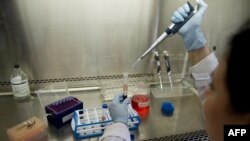Strong scientific evidence suggests high levels of a protein in the body may increase the risk of heart attack, cancer and other diseases. U.S. regulators have approved a test for the protein that could be useful in determining the risk of these diseases and their prognosis.
Galectin-3 is a molecule normally found in small amounts in cells, tissues and circulating blood. It works with the immune system to promote tissue repair, but too much of the protein can cause harmful inflammation that is involved in heart disease, cancer and kidney disease.
U.S. regulators have approved a blood test to check for elevated blood levels of galectin-3. It has only been approved for heart failure.
But Isaac Eliaz, who supplements his medical training with alternative therapies, predicts the galectin-3 test will soon be used by doctors as frequently as a routine test that checks for levels of c-reactive protein, a marker for inflammation.
Eliaz believes the galectin-3 test will warn physicians of serious health problems brewing in their patients years before they develop.
“You can see galectin-3 [levels] high in patients who are completely healthy, but you know that it is a time bomb," said Eliaz. "And if you watch them for a few years, if you do not take care of them, they will start showing up with rising with c-reactive protein and serious illnesses.”
Studies have shown that galectin-3 can promote cancer development and growth by helping cancerous cells create colonies or tumors.
The protein, Eliaz explains, leads to angiogenesis, the formation of new blood vessels that feed the original cancer colony and allow it to spread.
But there is a compound that can block the effects of galectin-3 and improve treatment of cancer and other chronic diseases, according to Eliaz. It is the tough pulp inside orange rinds and other citrus fruit called citrus pectin.
While the pectin molecules are too large to be absorbed by the body and are normally eliminated through the digestive tract, Eliaz says a modified form of the pectin can be absorbed, limiting the harmful effects of galectin-3.
“So if you can block galectin-3, you are taking away this inflammatory marker," Eliaz noted. "If you can prevent the scarring of the tissue, you are preventing aging, definitely.”
He says, if taken as part of a healthy lifestyle, the modified pectin will help prevent many diseases of aging, as well as cancer and heart disease, and improve cancer treatment.
Modified pectin is available as a supplement at health food stores.
Isaac Eliaz’s comments were made at the American Chemical Society meeting in Philadelphia, Pennsylvania.
Galectin-3 is a molecule normally found in small amounts in cells, tissues and circulating blood. It works with the immune system to promote tissue repair, but too much of the protein can cause harmful inflammation that is involved in heart disease, cancer and kidney disease.
U.S. regulators have approved a blood test to check for elevated blood levels of galectin-3. It has only been approved for heart failure.
But Isaac Eliaz, who supplements his medical training with alternative therapies, predicts the galectin-3 test will soon be used by doctors as frequently as a routine test that checks for levels of c-reactive protein, a marker for inflammation.
Eliaz believes the galectin-3 test will warn physicians of serious health problems brewing in their patients years before they develop.
“You can see galectin-3 [levels] high in patients who are completely healthy, but you know that it is a time bomb," said Eliaz. "And if you watch them for a few years, if you do not take care of them, they will start showing up with rising with c-reactive protein and serious illnesses.”
Studies have shown that galectin-3 can promote cancer development and growth by helping cancerous cells create colonies or tumors.
The protein, Eliaz explains, leads to angiogenesis, the formation of new blood vessels that feed the original cancer colony and allow it to spread.
But there is a compound that can block the effects of galectin-3 and improve treatment of cancer and other chronic diseases, according to Eliaz. It is the tough pulp inside orange rinds and other citrus fruit called citrus pectin.
While the pectin molecules are too large to be absorbed by the body and are normally eliminated through the digestive tract, Eliaz says a modified form of the pectin can be absorbed, limiting the harmful effects of galectin-3.
“So if you can block galectin-3, you are taking away this inflammatory marker," Eliaz noted. "If you can prevent the scarring of the tissue, you are preventing aging, definitely.”
He says, if taken as part of a healthy lifestyle, the modified pectin will help prevent many diseases of aging, as well as cancer and heart disease, and improve cancer treatment.
Modified pectin is available as a supplement at health food stores.
Isaac Eliaz’s comments were made at the American Chemical Society meeting in Philadelphia, Pennsylvania.




